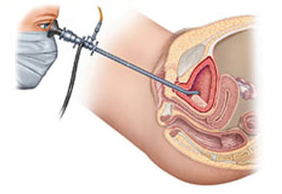Definition
Cystourethroscopy is a procedure used to examine the inside of the bladder and urethra.
How the Test is Performed
Cystoscopy is performed with a cystoscope, a specialized endoscope (a small telescope with a camera on the end) and typically takes between 5 and 20 minutes. The urethra (the tube that empties the bladder) is cleansed and local anesthetic jelly is applied. The cystoscope is then inserted through the urethra into the bladder. Sterile water flows through the cystoscope and the bladder is gently filled, much like a balloon, which allows examination of the entire bladder wall.

How Cystoscopy Will Feel
You may feel slight discomfort when the cystoscope is passed through the urethra into the bladder. You may feel the need to urinate when the bladder is full; however, it must remain full until the examination is complete. Once the procedure is complete, you will be allowed to empty your bladder. After the procedure, the urethra may be sore, and you may feel a burning sensation during urination for a day or two.
Why the Test is Performed
Cystourethroscopy can be useful in evaluation of some of the following problems:
- Loss of bladder control or overactive bladder
- Leakage of urine
- Inflammation caused by infection or injury
- Pouches in the bladder
- Growths that may or may not be cancerous
- Frequent urinary tract infections (UTIs)
- Blood in your urine
- Painful urination, Chronic Pelvic Pain, or Interstitial Cystitis
- Urinary stones
What to Expect Afterward
It is normal to experience mild stinging on passing urine for a day or two after the procedure. Drinking plenty of water can help this and can also prevent the development of infection or inflammation. If there is a small amount of blood in the urine after the cystoscopy, do not be alarmed as this is not unexpected and should resolve in a day or so.
If you develop chills, fevers or persistent painful urination, please contact our office immediately at 912.303.0891, as these may be signs of infection.
